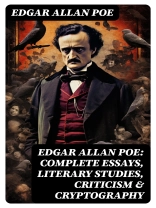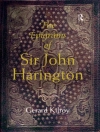In 'Edgar Allan Poe: Complete Essays, Literary Studies, Criticism & Cryptography, ’ the reader is invited into the profound and multifaceted mind of one of America’s most enigmatic authors. This comprehensive collection spans the breadth of Poe’s literary output, showcasing his innovative style that intertwines Gothic elements with a keen analytical approach to literature and cryptographic puzzles. Each essay illuminates not only the intricacies of his narratives but also his pioneering contributions to the fields of horror and detective fiction, uniquely situating Poe within the larger literary context of the 19th century. Edgar Allan Poe, born in 1809, faced personal tragedies and societal challenges that deeply influenced his work. His experiences of loss and his fascination with the macabre led him to explore dark themes and the psychology of human emotion. Poe’s critical essays reveal his enduring quest to define literary quality, underpinned by his meticulous attention to craft and form, making profound arguments that resonate to this day. This essential volume is a must-read for enthusiasts of Gothic literature, literary criticism, and cryptography alike. Poe’s astute insights and analytical prowess unveil the underlying structures of storytelling, inviting readers to engage with his work on a deeper level. With its scholarly breadth and depth, this collection is poised to enrich the understanding of Poe’s contributions and legacy.
O autorze
Edgar Allan Poe (1809-1849) was an American writer, editor, and literary critic renowned for his dark romanticism, a genre that he played a pivotal role in developing. Poe’s genius lay in seamlessly blending the macabre with psychological depth, forging an enduring legacy in the annals of literature. Best known for his poetry and short stories, especially his tales of mystery and the macabre, Poe has profoundly influenced the horror and detective fiction genres. His notable work 'The Raven’ is recognized for its melancholic and musical quality, while 'The Tell-Tale Heart’ and 'The Fall of the House of Usher’ showcase his expertise in building suspense and exploring complex psychological states. Poe’s contributions to literary theory are also significant, with 'The Poetic Principle’ and 'The Philosophy of Composition’ offering insightful examinations of his methods and aesthetics. The anthology 'Edgar Allan Poe: Complete Essays, Literary Studies, Criticism & Cryptography’ encompasses the breadth of Poe’s intellectual pursuits. The author’s fascination with the enigmatic is evident in his cryptological writings, reflecting his interest in secret writing as both a literary device and a puzzle. Poe’s intricate prose and thematic versatility continue to mesmerize readers, ensuring his place as a central figure in both American literature and the broader Gothic tradition.












